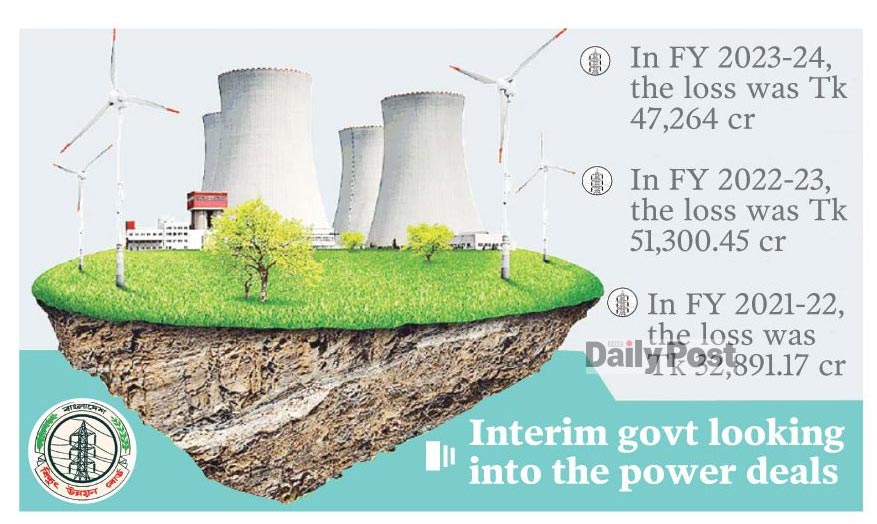Bangladesh Power Development Board (BPBD) has made a mountain of losses. In the last three financial years, the company has counted a loss of about Tk 1,31,000 crore.
To avoid the losses, the government has taken some new policies to handle the crisis and develop the circumstances. The government has signed a deal to import electricity from Nepal. In the first stage, the agreement is about only 40MW, but after checking the transmission line's capability, the supply amount will be increased.
The government gave subsidy of about Tk 1,07,000 crore during that period to meet the deficit. The country has created twice the production capacity of electricity demand, but it is not being fully utilized. Several power plants have to be shut down.
Meanwhile, the production capacity is now not being used to meet the demand for electricity in the energy crisis. But even if there is no production, the power plants have to pay capacity charges as per the contract.
As a consequence, BPDB's losses are increasing day by day despite providing enough subsidies. And to reduce the pressure of subsidy, the price of electricity is being increased in phases, this information is known from BPDB sources.
According to the sources, BPDB incurred a loss of Tk 47,264 crore in the fiscal year 2023-24. At that time, BPDB was given a subsidy of Tk 38,289.30 crore. In the fiscal year 2022-23, BPDB incurred a loss of Tk 51,300.45 crore and gave subsidy of Tk 39,534.95 crore. In the fiscal year 2021-22, BPDB incurred a loss of Tk 32,891.17 crore and gave subsidy of Tk 29,654.43 crore.
At present, the total power generation capacity of the country is 27 thousand 791 MW. However, the average daily production is 13,000 to 14,000 megawatts. So far, a maximum of 16 thousand 477 MW has been generated.
According to sources, the demand for electricity in the country is increasing every year. As a result, the use of energy in power generation is also increasing. New power plants are being installed. The amount of capacity charge is also increasing.
Moreover, coal and oil-based power generation has increased by reducing the use of gas. This has increased the cost of BPDB. In such a situation, the loss cannot be handled even by increasing the price of electricity several times and giving huge subsidies.
In such a situation, experts think that expensive oil-based power plants need to be closed. Because the production cost per unit of oil-based power plants is more than Tk 20. Oil-fired power plants can only be used during night peak hours.
In 2010, the previous government enacted a law titled 'Rapid Enhancement of Supply of Electricity and Energy (Special Provision)' for two years. Later, the tenure of the law was extended for 14 years in three phases. In the last 14 years, more than 100 power plants have been licensed in the private sector. All power plants were approved under special laws related to power and energy sector without any tender.
Since 2010, there have been allegations of irregularities, corruption and looting against those small and big centers, but no action has been taken. On the contrary, the path of justice was blocked by passing the Immunity Act.
Of lately, the interim government suspended all ongoing activities under the Special Provisions Act to increase the supply of electricity and energy quickly. The national committee formed to review the agreements made under special provisions during the previous government has issued a public notice seeking information from the people about corruption.
Adani Power has put pressure to collect their due payment, but there is a problem with the June and August ledger amounts. Adani claimed about $80 crore and BPDB agreed to $54.54 against their demand.
At the same time, it has been decided to scrutinize the power supply agreements of 11 companies, including India's Adani and Summit power. Therefore, the National Review Committee formed by the government has summoned all the documents related to those power plants.
Meanwhile, the agreement signed under the Rapid Supply Enhancement of Electricity and Energy (Special Provisions) Act is being reviewed. For this, the second meeting of the National Review Committee held at Bidyut Bhaban on September 28 decided to collect relevant documents and data of 11 power plants.
The power plants include Summit Group's Meghnaghat 583MW and Kodda 300MW, Paramount Group's Baghabari 200MW, former Chief Whip ASM Feroz's Patuakhali 150MW, Orion Group's Mongla 100MW Solar Power Plant, Youth Group's Midland Power Company's Ashuganj 150MW, former Awami League MP Tahjib Alam Siddiqui's Doreen Power's Manikganj 162MW, Beximco Group's Sundarganj 200MW Solar Power Plant. Intraco Group's Lalmonirhat 30MW Solar Power Plant, HDFC Synpower's Sutiakhali 50MW Solar Power Plant and India's Adani Group's 1600MW Power Plant.
Md Shamim Hasan, director (Public Relations) of BPDB said, we plan to complete the scrutiny of these companies ahead of the next summer. We are arranging an open tender for solar power plants, which will reduce the cost.
ZH






